He will be the first tiger to be released after serving his sentence.
At the beginning of this month, a criminal ruling issued by Beijing No.1 Intermediate People’s Court showed that Tong Mingqian, former vice chairman of Hunan Provincial Political Consultative Conference and now serving his sentence in Qincheng Prison, received a six-month commutation, and his sentence after commutation will expire on June 30, 2018.
Tong Mingqian will be the first tiger to be released after serving his sentence.
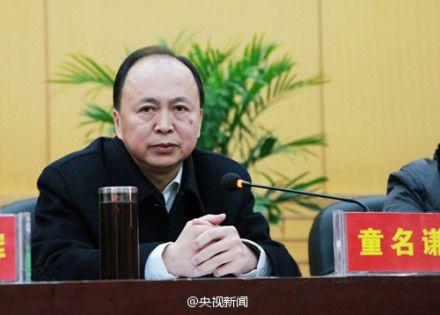
Incident
— — The bribery case that shocked the whole country.
The story of Tong Mingqian, the "first tiger" in Hunan after the 18th National Congress of the Communist Party of China, from a senior official at the provincial and ministerial level to a criminal in jail, begins with the election more than five years ago.
From December 28th, 2012 to January 3rd, 2013, the first meeting of the 14th People’s Congress was held in Hengyang City, Hunan Province. In the process of electing the deputies to the 12th People’s Congress of Hunan Province by difference, what was later called "the most serious case of sabotaging the election since the establishment of the new China People’s Congress system" appeared.
According to the situation investigated later, the severity of this bribery election case is shocking.
According to Xinhua News Agency, among the 76 provincial people’s congress deputies elected in Hengyang at that time, 56 people sent money to canvass votes, totaling more than 110 million yuan, and the per capita money was nearly 2 million yuan, which did not include the usual money for dinner. Of the 527 Hengyang Municipal People’s Congress deputies who attended the meeting, 518 received more than 100 million yuan in money and goods.
The staff of Hengyang Municipal People’s Congress participated in receiving and distributing money, and 68 staff of the Congress received a total of 10.01 million yuan.
At the beginning of April 2013, the cover of Hengyang’s sabotage election case, which was tried by some forces, was finally completely uncovered with the direct intervention of the central government and the vigorous promotion of the Hunan Provincial Party Committee.
Since April 2013, a thorough investigation storm has been launched in Hengyang, and a large number of people involved in the case have fallen.
In Hengyang officialdom, there were nearly 500 people who were seriously dereliction of duty, dereliction of duty and violation of discipline in this case, including Tong Mingqian, then secretary of Hengyang Municipal Party Committee.
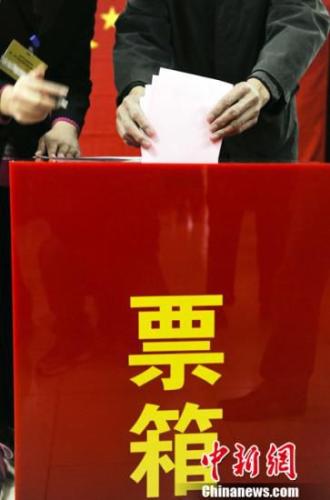
China News Service reporter Liu Zhenshe
crime and punishment
— — Mr. Nice guy was sentenced to five years in prison for dereliction of duty.
On December 18th, 2013, the website of CPC Central Commission for Discipline Inspection released a message that Tong Mingqian, who had been the vice chairman of Hunan Provincial Political Consultative Conference at that time, was suspected of serious violation of discipline and law and was under investigation. A few days later, Tong Mingqian was "double opened".
CPC Central Commission for Discipline Inspection mentioned in his briefing on Tong Mingqian:
During his tenure as secretary of Hengyang Municipal Committee of Hunan Province, Tong Mingqian, as the leader of the leading group for the city’s general election and the first responsible person for serious general election discipline, did not perform his duties correctly, and did not take effective measures in time to seriously investigate and deal with the bribery problems exposed before and after the election of Hunan Provincial People’s Congress by Hengyang Municipal People’s Congress, which led to serious cases of violation of discipline and law that undermined the election by bribery, causing great losses to the interests of the party, the country and the people, and extremely bad political and social impacts.
More than seven months later, on July 24, 2014, the famous "Mr. Nice guy" in local officialdom stood in the dock of Beijing No.2 Intermediate People’s Court. On August 18th, Tong Mingqian was sentenced to five years’ imprisonment for dereliction of duty.
After the trial of Tong Mingqian case, China Discipline Inspection and Supervision Newspaper published a commentary entitled "Not only checking corrupt officials but also treating mediocre officials". According to the article, as the first senior official who was dismissed for dereliction of duty since the 18th National Congress of the Communist Party of China, the sample significance of Tong Mingqian’s case is enormous: the fight against corruption can’t stop at the fight against corruption, and inaction for officials is also corruption.
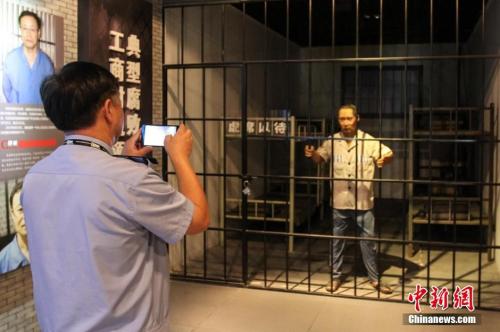
reduce a penalty
— — Became an activist for prison reform for two consecutive years.
According to the judgment of Beijing No.2 Intermediate People’s Court, Tong Mingqian was detained on January 1, 2014 on suspicion of dereliction of duty, arrested on January 14 of the same year, and then detained in Qincheng Prison of the Ministry of Public Security.
After spending more than four years in prison, in March this year, the Beijing No.1 Intermediate People’s Court issued a public notice on the trial of Tong Mingqian’s commutation case. In June, the hospital issued a criminal ruling on the commutation of Tong Mingqian’s dereliction of duty.
According to the ruling, Qincheng Prison, the executive organ, proposed to reduce the sentence of Tong Mingqian, a criminal. Qincheng Prison believes that Tong Mingqian, a criminal, can plead guilty and repent, seriously abide by laws, regulations and prison rules, obey management and actively reform during the period of serving his sentence. In 2015 and 2016, he won the award of prison reform activists for two consecutive years. According to Tong Mingqian’s reform and reward, Qincheng Prison put forward suggestions on reducing Tong Mingqian’s sentence.
In the ruling, Beijing No.1 Intermediate People’s Court stated that during the period of serving his sentence, Tong Mingqian pleaded guilty, repented, abided by laws, regulations and prison regulations, and received education and reform, and his sentence could be reduced. However, in view of the fact that the offender is a duty criminal, the extent of his commutation should be strictly controlled.
Finally, the court ruled that Tong Mingqian was sentenced to six months’ imprisonment (the sentence that should be executed after commutation is from January 1, 2014 to June 30, 2018).
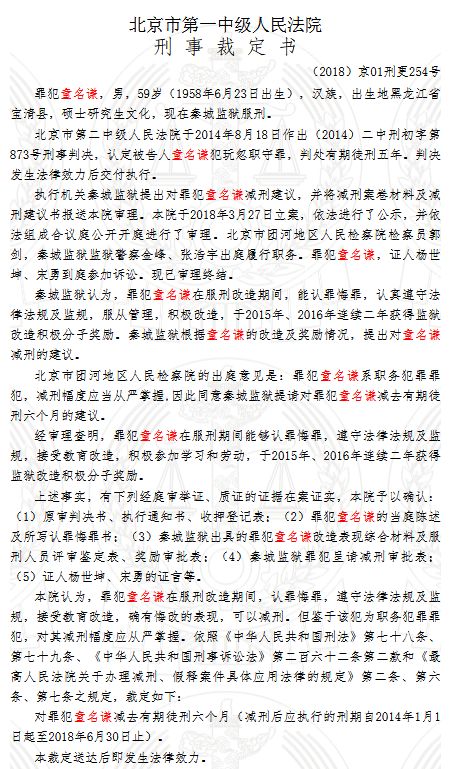
In fact,Up to now, among the provincial and ministerial officials who have been sentenced since the 18 th National Congress, Tong Mingqian is not the shortest sentence.
For example, in November 2016, Zhang Lijun, former vice minister of environmental protection, was sentenced to four years’ imprisonment for accepting bribes.
Another example is that in May 2017, Zheng Yuzhen, former deputy director of the Standing Committee of Liaoning Provincial People’s Congress, was sentenced to three and a half years for the crime of sabotaging elections and accepting bribes.
However, Tong Mingqian, whose sentence has been commuted, will be the first provincial and ministerial official whose sentence will expire after the 18th National Congress.
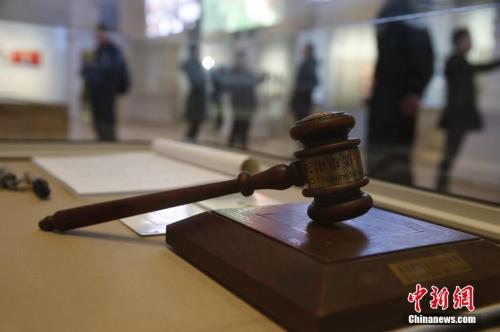
China News Service reporter Zhang Hao photo
What is the basis of Tong Mingqian’s commutation?
According to the above ruling, Tong Mingqian’s commutation can be found in the relevant legal provisions.
Article 78 of the Criminal Law clearly stipulates that a criminal sentenced to public surveillance, criminal detention, fixed-term imprisonment or life imprisonment may have his sentence reduced if, during the execution period, he earnestly abides by prison regulations, receives education and reform, shows genuine repentance, or performs meritorious service.
According to the above-mentioned ruling on Tong Mingqian’s commutation, Tong Mingqian’s commutation should belong to "observing the prison regulations seriously, accepting education and reform, and really showing repentance".
The Provisions of the Supreme People’s Court on the Specific Application of Laws in Handling Cases of Commutation and Parole, which came into effect on January 1, 2017, also clarified that:
The starting time of commutation for criminals sentenced to fixed-term imprisonment is: if they are less than five years of fixed-term imprisonment, they should be executed for more than one year before commutation; If a person is sentenced to fixed-term imprisonment of not less than five years but not more than ten years, he shall be sentenced to one year and six months before his sentence can be reduced; If a person is sentenced to fixed-term imprisonment of not less than 10 years, his sentence shall be commuted after two years. The starting time of commutation of fixed-term imprisonment is calculated from the date of execution of the judgment.
Those who do show repentance or render meritorious service shall be sentenced to fixed-term imprisonment of not more than nine months at a time; Those who do show repentance and perform meritorious service shall be given a reduced sentence of not more than one year in prison at a time; Those who have made significant meritorious service shall be sentenced to fixed-term imprisonment of not more than one year and six months at a time; Those who do show repentance and make significant meritorious service shall be given a reduced sentence of not more than two years’ imprisonment at a time. (Kan Feng)